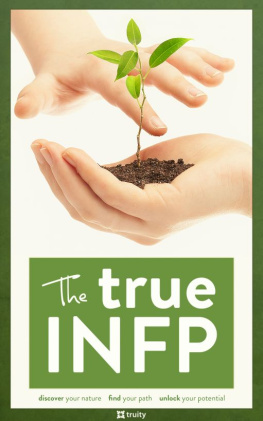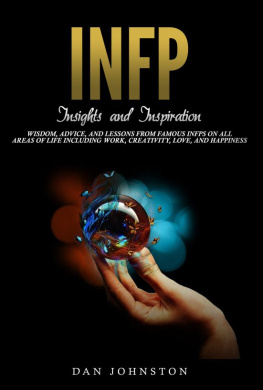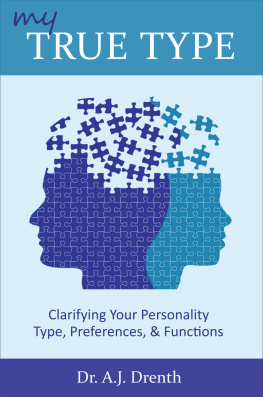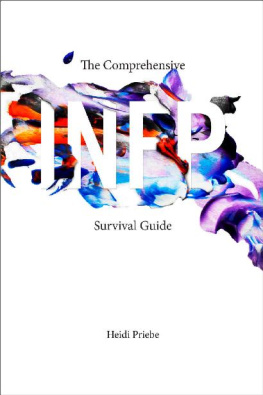The True INFP
By Truity
Copyright 2014 Truity PsychometricsLLC
Smashwords Edition
Preface
What is Personality Type?
Whatever the circumstance of your life, theunderstanding of type can make your perceptions clearer, yourjudgments sounder, and your life closer to your heart'sdesire.
- Isabel Briggs Myers
In the middle of the twentieth century, amother-daughter team named Katherine Briggs and Isabel Briggs-Myersset out to develop a system to explain the individual differencesthey observed in the people around them. They wanted to know howthey could describe the diversity they saw in the way their familyand friends thought, made decisions, and organized their lives.
With the help of a text by psychologist Carl Jung,Briggs and Myers came up with a system of four dimensions ofpersonality, each described as a choice between two opposingstyles.
Extraversion vs. Introversion: Is a person energizedby time with others, or by time on their own?
Sensing vs. Intuition: Does a person think in termsof concrete facts, or abstract ideas?
Thinking vs. Feeling: Is a person more concernedwith cooperation and compassion, or logic and objectivity?
Judging vs. Perceiving: Does a person prefer to livetheir life in a structured, organized manner, or do they like to bemore flexible and spontaneous?
The combination of these four dimensions, each withtwo possible styles to choose from, led Briggs and Myers todescribe 16 different personality types. Each of the sixteen typeswas assigned a four-letter code based on their style on eachdimension, like ESTJ or INFP.
Since Myers and Briggs developed their system ofpersonality types, much work has been done to describe and researcheach of the types. Today we have a wealth of information about howeach type approaches life, relationships and work.
This book is an introduction to the INFP type, whatdrives and motivates the INFP, and how INFPs can reach their fullpotential. If you are an INFP, it will help you to understand howto be the best person you can be. If you know an INFP, it will helpyou to understand and appreciate the unique makeup of thissensitive, creative personality type.
Chapter 1
Introduction to the INFP
I took a deep breath and listened to the old bray ofmy heart. I am. I am. I am.
- Sylvia Plath
INFP is also known as the Healer personality type.The letters INFP stand for the following dimensions ofpersonality:
Introverted: reflective, introspective, soft-spoken,thoughtful
iNtuitive: imaginative, creative, holistic,metaphorical, intellectually playful
Feeling: empathic, appreciative, sensitive,sympathetic
Perceiving: flexible, adaptable, theoretical,spontaneous
Vital Statistics
INFP in the Population
Approximately 4 percent of the population can beclassified as INFPs. This includes 5 percent of women and 3 percentof men.
Famous INFPs
The list of famous people and fictional charactersbelieved to be INFPs includes:
Albert Schweitzer
Vincent Van Gogh
Princess Diana
Jane Goodall
John Lennon
Henry Wadsworth Longfellow
Edgar Allan Poe
William Shakespeare
Anne of Green Gables
Hans Christian Anderson
William Blake
J.R.R. Tolkien
Fox Mulder, character from The X-Files
Joan of Arc
C.S. Lewis
A.A. Milne, author and creator of Winnie thePooh
Winnie the Pooh (of course)
Kurt Cobain
Helen Keller
Audrey Hepburn
Neil Diamond
Fred Mr. Rogers
Sylvia Plath
J.K. Rowling, Harry Potter author
Don Quixote
E.T. the Extraterrestrial
Richard Roundtree (were talkin bout Shaft!)
Carl Rogers, famous Humanistic psychologist
Isabel Myers-Briggs, founder of the Myers-BriggsType Indicator system
Chapter 2
The Inner Lives of INFPs
Only do what your heart tells you.
- Diana, Princess of Wales
Cognitive Styles: The Path toUnderstanding
Perhaps more than any other personality type INFPssee the big picture and do everything in their power to align theirthinking patterns and decision making processes with this birdseye viewpoint. Constantly self-reflective, INFPs are always on thelookout for inclusive theoretical concepts that will allow them tocorrectly categorize everything they learn, observe and experience.They have an inherent ability to find hidden order where at firstglance things appear chaotic and unconnected.
While many people believe that solid, hard factsimpose order on the world in a way that requires passiveacceptance, INFPs see facts as isolated patches of data that mustbe assimilated into an integrated ideological quilt before they canbe properly understood. As irrepressible idealists devoted to theinterpretation stage INFPs carry out intensive internal dialoguesthat help them uncover deep connections that are not readilyapparent to others. Because they put so much thought and effortinto analysis INFPs frequently surprise their friends and lovedones with the surprising choices they make, the complex ideas theyexpress and the sage advice they choose to give.
From the perspective of the INFP metaphor is one ofthe most powerful concepts in the universe. Hidden behind discretebits of information is the potential for synthesis and harmony, andINFPs are like detectives who continually search for the keys thatwill unlock the doors that block our path to comprehension. Throughthe use of metaphor, which allows us to see subtle patterns andrelationships that are normally overlooked, INFPs believe it ispossible to escape the cloudy thinking and confusion that can oftenlead us to make decisions that undermine rather than promote ourbest interests. INFPs know that we all see everything through anindividualized lens of perspective, and each of our lenses must befinely ground and constantly re-focused to make sure our visionremains clear and reliable.
INFPs see the consequences of their actions as amatter of the utmost importance. INFPs have a great respect forknowledge and for people as well, and they will never make rash orpremature decisions when there are a range of vital factors toconsider. As long as the stakes are high the standards of INFPswill remain even higher, and no one who knows them will ever accusethem of being imprudent in their calculations or reactionary intheir outlook.
Because compassion and idealism are the voices oftheir conscience INFPs always place the highest priority onreconciliation. They want human beings (and other living creatures)to come together, and they also want to unite important events andsignificant phenomena that have been artificially separated byshort-sighted assumptions. As idealists and healers INFPs see deepintellectual analysis as a means to a much greater end, andwhenever there are questions to be answered or problems to besolved they are always in search of the perfect solution that willbring everyone together and promote the best interests of all.
Emotional Makeup
Driven by empathy and idealism, INFPs takeeverything that happens around them personally. To a significantextent they experience the suffering, disappointment andfrustration of others as if it were their own. Like finely-tunedinstruments INFPs are astoundingly sensitive to their environmentsand to all those who inhabit them, and at times they can feel as ifthey are literally drowning, so overwhelmed are they by the miseryand quiet desperation that surrounds them. Fortunately they alsoexperience the pleasures and triumphs of others as if they weretheir own, and this capacity to experience cathartic joy helpsloosen the hold of the darker forces.
Next page











